Hatice Karaaslan, Stephanie Lea Howard, Gamze Güven-Yalçın, Mümin Şen, Müge Akgedik, Ebru Sınar-Okutucu, Gökçe Arslan, Abdulkadir Güllü, Aslıhan Tuğçe Güler, Hülya Şen*, Neslihan Atcan-Altan, Ayşe Çakır, Pelin Akıncı-Akkurt, Edin Omerovic, Fatima Rocchi-Whitehead, Metin Esen, Pınar Üstündağ-Algın, Gabor Kotik, Aslı Üstün, Nurseven Kılıç
Ankara Yıldırım Beyazıt University, Turkey
*Middle East Technical University, Turkey
Karaaslan, H., Howard, S. L, Güven-Yalçın, G., Şen, M., Akgedik, M., Sınar-Okutucu, E., Arslan, G., Güllü, A., Güler, A. T., Şen, H., Atcan-Altan, N., Çakır, A., Akıncı-Akkurt, P., Omerovic, E., Rocchi-Whitehead, F., Esen, M., Üstündağ-Algın, P., Kotik, G., Üstün, A. & Kılıç, N. (2019). The visual message board: A closer look at the learning advisors’ identity construction process. Relay Journal, 2(2), 333-358. https://doi.org/10.37237/relay/020209
[Download paginated PDF version]
*This page reflects the original version of this document. Please see PDF for most recent and updated version.
Introduction by Hatice Karaaslan
The purpose of life is to discover your gift; the work of life is to develop it; the meaning of life is to give your gift away.
—David Viscott, Finding Your Strength in Difficult Times, 1993
One’s identity formation process as a learning advisor is inevitably determined or molded by her or his personality features that stand out. It is often these prominent characteristics that dominate her or his understanding of and attitude towards the science and practice of language advising although it is very likely that the formal advisor training content often helps surface relatively dormant qualities as well. In this respect, the focus in this visual message board is how nineteen learning advisors from Ankara Yıldırım Beyazıt University School of Foreign Languages (AYBU-SFL) and one from the Middle East Technical University School of Foreign Languages (METU-SFL) define their advisor selves with reference to their most prominent characteristics as reflected in their end-of-the-course thank you and appreciation cards designed by their trainers.
This idea of giving cards each displaying an outstanding feature of individual trainees upon the completion of advising training was first started by Satoko Kato and Jo Mynard during their training at Kanda University of International Studies (KUIS) with the first group of learning advisor candidates from AYBU-SFL and METU-SFL in 2017. It was made into a tradition in the following year by the novice trainers Gamze Güven-Yalçın and Stephanie Lea Howard during their advisor education program in Turkey with a new group of learning advisor candidates from the same university. In the original KUIS version, each card contained the Japanese character that corresponded to the specific quality each advisee displayed as observed by the trainers during their intensive training program over a period of one week. In the AYBU-SFL version, building on this creative idea but introducing a new perspective, specific trainee qualities were presented in caterpillar frames representing the transformation taking place, from caterpillars to butterflies.
In what follows, individual advisors reflect on their advisor selves with reference to the features expressed in their cards, adopting a descriptive and/or explanatory style. Figure 1 below is a butterfly displaying a collection of individual advisors’/caterpillars’ outstanding qualities as expressed in descriptive words.
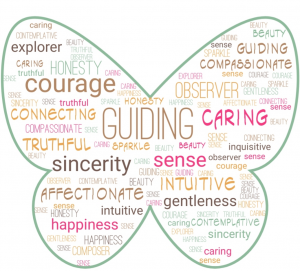
Figure 1. Butterfly Word Cloud Showing the Descriptive Words for the Advisors
As such, it is a privilege to be in a position to write an introduction to these beautifully crafted cards describing twenty learning advisors’ most outstanding qualities that blend smoothly with their identities as advisors. And it is again an honor to present all these accompanying reflective pieces in varying genres written by the learning advisors themselves to celebrate this moment of unification with their advisor selves. Obviously, the contributors here gathered around this advising candle for no random reason: Are they here to discover their gifts? Or they have already uncovered their gifts but looking for ways to develop them or give them away to attain the meaning of their lives? Each card and accompanying caption reveals a glimpse of an advisor’s, and indeed a person’s, identity.
The Cards with Reflective Captions
The first set of cards with the Japanese characters displaying individual advisors’ prominent characteristics and short descriptive sentences were designed by Satoko Kato and Jo Mynard upon their training at KUIS, and the accompanying reflective captions were written by the first group of trainees from AYBU-SFL and METU-SFL defining their advisor selves with reference to what the cards and the short descriptions mean to them as advisors.
The second set of cards with the specific trainee qualities and corresponding descriptions presented in caterpillar frames representing the transformation taking place were designed by Gamze Güven-Yalçın and Stephanie Lea Howard upon their training at AYBU-SFL, and the accompanying reflective captions were written by the second group of trainees from AYBU-SFL defining their advisor selves with reference to what the cards and the short descriptions mean to them as advisors.
Gentleness – Hatice Karaaslan Gentle is the word most frequently used to describe me, my words and attitude. Still, I was surprised to see my trainers had decided to prepare this precious card for me around the concept of gentleness. I was amazed by their skill at reading our personalities in such a short time. No wonder they are great advisors! Not only during my sessions with advisees, but also in any kind of (human) contact I have, I pay special attention to the saying ‘You can’t shake hands with a clenched fist’ in order to intentionally avoid conflict. I always try to make people feel relieved and empowered in my presence as I believe people, especially when they are vulnerable and tense, need nothing but tenderness and mild-manners in order to relax, open up, and realize their full-potential. I always aim for a stress-free environment, and to be a strong, reliable hand with a soft touch. As such, it takes a lifetime to write this entry. Thank you.
Gentle is the word most frequently used to describe me, my words and attitude. Still, I was surprised to see my trainers had decided to prepare this precious card for me around the concept of gentleness. I was amazed by their skill at reading our personalities in such a short time. No wonder they are great advisors! Not only during my sessions with advisees, but also in any kind of (human) contact I have, I pay special attention to the saying ‘You can’t shake hands with a clenched fist’ in order to intentionally avoid conflict. I always try to make people feel relieved and empowered in my presence as I believe people, especially when they are vulnerable and tense, need nothing but tenderness and mild-manners in order to relax, open up, and realize their full-potential. I always aim for a stress-free environment, and to be a strong, reliable hand with a soft touch. As such, it takes a lifetime to write this entry. Thank you.
Truthful—Stephanie Lea Howard
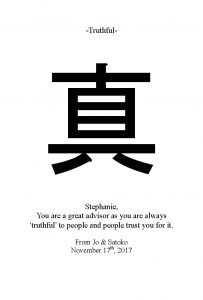 Being Truthful is both a blessing and a curse. I try to be up front about a lot of things with my advisees, even if that means I tell them things that they did not necessarily want to hear. In my experience, most advisees already know deep inside themselves that it took a long time for their problem to develop and as such, it will not be solved overnight. It would be a huge disservice for me to state otherwise. Advising is not always sunshine, roses, and blue skies. Sometimes it involves a lot of struggle, time, and real effort. Sometimes this can lead to self-doubt and a period of low-motivation. I try to guide my advisees into acknowledging the truth of these feelings. Nobody is perfect, nor will anybody ever be 100% perfect. Why then should the advisee disparage themselves when ‘life happens’ and they experience a moment of insecurity? Rather, accepting these feelings as being real and learning to see them as part of the normal process of improvement (and even part of normal life) is truly encouraging. Feeling weak and insecure today? This happens sometimes: it is the process that is more important —forward effort— than the highs or lows of the individual day. My hope is that advisees learn to become truthful with themselves. Yes, I did not get the high test score I wanted today. It was a low score and I truthfully just want to cry about it. That’s ok, because even rollercoasters have dips and dives that make people scream, knowing full well that they will exit the ride perfectly safe. It is part of the process; it is the truthful effort that counts.
Being Truthful is both a blessing and a curse. I try to be up front about a lot of things with my advisees, even if that means I tell them things that they did not necessarily want to hear. In my experience, most advisees already know deep inside themselves that it took a long time for their problem to develop and as such, it will not be solved overnight. It would be a huge disservice for me to state otherwise. Advising is not always sunshine, roses, and blue skies. Sometimes it involves a lot of struggle, time, and real effort. Sometimes this can lead to self-doubt and a period of low-motivation. I try to guide my advisees into acknowledging the truth of these feelings. Nobody is perfect, nor will anybody ever be 100% perfect. Why then should the advisee disparage themselves when ‘life happens’ and they experience a moment of insecurity? Rather, accepting these feelings as being real and learning to see them as part of the normal process of improvement (and even part of normal life) is truly encouraging. Feeling weak and insecure today? This happens sometimes: it is the process that is more important —forward effort— than the highs or lows of the individual day. My hope is that advisees learn to become truthful with themselves. Yes, I did not get the high test score I wanted today. It was a low score and I truthfully just want to cry about it. That’s ok, because even rollercoasters have dips and dives that make people scream, knowing full well that they will exit the ride perfectly safe. It is part of the process; it is the truthful effort that counts.
Connecting – Gamze Güven-Yalçın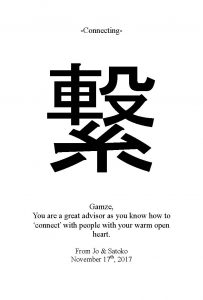 Connections to all the people and things around literally define who we are; from the connection to our own soul to the one to the others’. As I truly believe these invisible threads are the strongest ties, no other words could better define how I name the essence of life than the one my advisor mentors call me with: Connecting. Since the training at KUIS, advising has been an immensely meaningful journey to me. Sometimes, reaching out and taking someone’s hand is the beginning of this journey. At other times, it is allowing another to take mine. It is like finding me in all others as I am a part of all that I have met. After all, aren’t we like islands in the ocean, separate on the surface but connected in the deep?
Connections to all the people and things around literally define who we are; from the connection to our own soul to the one to the others’. As I truly believe these invisible threads are the strongest ties, no other words could better define how I name the essence of life than the one my advisor mentors call me with: Connecting. Since the training at KUIS, advising has been an immensely meaningful journey to me. Sometimes, reaching out and taking someone’s hand is the beginning of this journey. At other times, it is allowing another to take mine. It is like finding me in all others as I am a part of all that I have met. After all, aren’t we like islands in the ocean, separate on the surface but connected in the deep?
Happiness – Mümin Şen A moment of Happiness
A moment of Happiness
I see the shine in their eyes
Then come the powerful ideas
That pave the road to the land of dreams
Thought to not exist before
I feel the flow of energy
Then flourish the seeds of life
That create a heaven for new beginnings
I hear my heartbeat
I feel the peace
I see a smile
Guiding – Müge Akgedik
The moment I got the precious card, Guiding, from our tutors at KUIS, I felt as if Jo and Satoko had known me long before we met. Guiding, advising and having a genuine interest in the issues others are experiencing had always been part of my life. Later on, after a deep internalization of the advising philosophy, I realized that being ‘guiding’ is never telling the other parties what to do but only ‘guiding’ them as a shadow beside them through their own path, without interfering with their choices. It is sometimes only listening to the advisee silently nodding or sharing the silence as some only need to hear what they themselves would say to find the correct answer or that they are not alone. Since my advising journey began, I have been trying hard to ‘guide’ almost all around me, touching their soul, clearing their path. This may be the reason I live for…
Sparkle – Ebru Sınar-Okutucu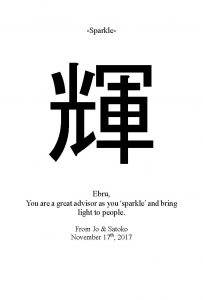
Just a Sparkle is the thing that I look for in my advisees’ eyes because I believe that tiny little light is the trigger of the fireworks that they will be able to see at the end of each of their journeys! I know every celebration hides sweat, effort and struggle behind it and I, as an advisor, try to help my advisees to find out their own sparkles that will enlighten their way and brighten their days through this celebration. No matter what is in store for us in the end, it is the sparkly journey that matters.
Courage – Gökçe Arslan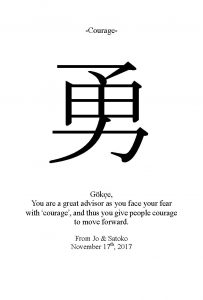
“Two roads diverged in a wood and I chose the one less traveled by”, a line from my favorite poet, Robert Frost (1991). I love it as I am not afraid to try different things as I have the Courage. This was the word that I got. This was the word I was surprised to find on my card as only the people who know me can say that I like adventures and trying new things all the time. Yet, at the time, I did not think that word really described my advisor personality; I thought that they made a very good guess about my life. When I started conducting advising sessions, I realized an important fact: You cannot change who you are in the advising sessions; if you like doing something in your real life, you put that part of yourself into your advising sessions in a way as to help your advisees. It takes courage to either try something new with your advisees or try to help the learner to see that there is another road less traveled and that it is fine to choose that road.
Frost, R., Untermeyer, L., & Frost, R. (1991). The road not taken: A selection of Robert Frost’s poems. New York: H. Holt and Co.
Sense – Abdulkadir Güllü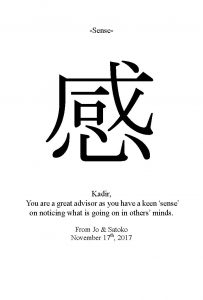
Sense is a word with various meanings. When I first read my card, I thought about the word “sensible” because I have always seen myself as being sensible, calculating and controlling the variables and outcomes like clockwork. At the beginning of my journey as an advisor, one of the biggest challenges I faced was letting go of my controlling side to allow some room for my advisees to take control of the process. Over time, I discovered the meaning of sensitive, taking into account the feelings of advisees, the hardships they have had to endure, and how to approach them as an understanding and keen listener. When I was transforming as an advisor with this new concept, so did the word sense for me, and the underlying message behind my card.
Honesty – Aslıhan Tuğçe Güler
Honesty is the best policy, a statement often attributed to Benjamin Franklin. First, I should confess that I was surprised when my mentors figured out one of my extreme personality traits which is hard to cope and live with. There is a thin line between holding the truth inside and being honest. An overwhelming urge forces some people to be crystal clear under even unfavorable circumstances, which is the definition of honesty for me. In my professional career, both as an experienced teacher and a novice advisor, it has been rather challenging for me to guide my advisees to be open towards themselves, as honesty includes being honest to oneself, as well. I never get tired of listening to my advisees and guiding them as they explore their unique ways of learning and transform during this long and tiring process. To be honest, it is always worth believing in each one of them and sharing the happiness of success together in the end.
Beauty – Hülya Şen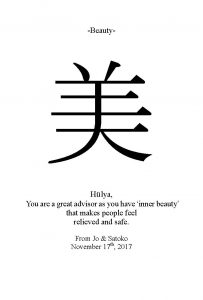
I have always envied the introverts who mostly reflect before they act; I used to be a free soul enjoying the moment. When I look back at the last couple of months, super busy with advising and teaching, I have spent a considerable amount of time thinking over a completed session, keeping track of sessions, writing reflective journals, and speculating on previous sessions with my mentor. Actually what I have done is a lot more than thinking as I have discovered a lot about my advisees, myself, and my capabilities. I have transformed into a person who has a really active mind and who instigates a constant internal dialogue; a person who enjoys deep conversations, learning, and listening to others. When I received the Beauty card from my trainers in Kanda, I didn’t have a clue about the hidden connotations. Once I started to see the beauty in reflecting, beauty in supporting others, I came to see the realizations hidden in the card.
Compassionate – Neslihan Atcan-Altan
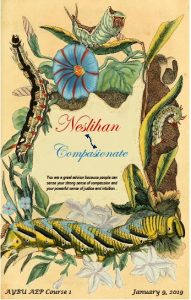
Compassion is one of the qualities which sustains the preservation of humanity. It’s with compassion that communities stick together, nurture each other, and maintain their existence. Being compassionate enables me to quickly relate to and empathize with my advisees’ hardships as I can swiftly shift my perspective to the one they’re offering. This allows me to quickly come up with similar situations that I’ve been in so that I can point out those commonalities in terms of experience, which in most cases proves to be useful since the learners realize they’re not alone—or not as alone as they think at least. However, it might also hinder me from being brutally honest with them when it’s required as I fear that my honesty might hurt their feelings and the connection we have might be broken. Having said that, at the end of the day, what does wanting to help others require if not being compassionate? Volunteering to handle delicate issues with vulnerable people means a massive responsibility, which demands the utmost care and consideration. So, I will keep up my compassionate attitude with my learners while I also work on not being hesitant to practice other aspects of being an advisor.
Caring – Ayşe Çakır
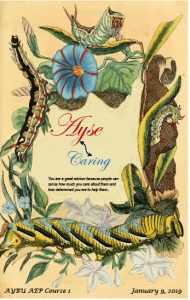
Caring was the adjective which was chosen to describe me by our trainers. I believe this is very true for me. I volunteered to be an advisor just because I care about my students very much and I want to help them in any way I can. However, when I started to learn about advising, I quickly became aware that caring is only the beginning. To be a good advisor I need to be equipped well, otherwise too much caring can be a liability for me. I feel too deeply for my advisees’ problems and that causes me to have the urge to solve their problems immediately, which I must not do at all. I have to let my advisees realize their own problems, weaknesses, strengths, etc. They need to find their own solutions, trust themselves, and become independent learners. As for the positive side of being a caring advisor, I can say that advisees see themselves as being precious and unique, which I believe they are. Therefore, they trust the advisor and open up easily. I know that I have a long way to be a good advisor, but being a caring person will always encourage me to improve myself in this long but meaningful journey.
Contemplative – Pelin Akıncı-Akkurt
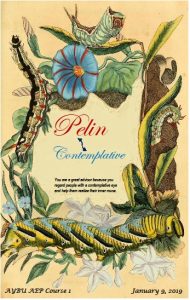
Contemplative was the word chosen to describe me by my trainers and this is amazing for me since putting the mind in the heart is so important for me. I believe our most inspiring moments are our contemplative moments and this is a glimpse of my transformation. I want my advisees to find a safe place where their authentic voice will be heard. They will be met with unconditional acceptance and they will have the freedom to question themselves, reflect on what they want to achieve, to contemplate their process, and embrace their potential. As we see in the memorable words often attributed to Exupery “It is only with the heart that one can see rightly; what is essential is invisible to the eye.”
Composer – Edin Omerovic
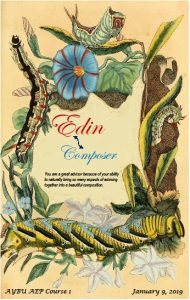
It is a beautiful gift in that every advisor is a story worth telling. Being an advisor I have not just learned how to help students with their learning difficulties, but I have learned a great deal about myself. In advising sessions, I take care to welcome learners as they are do me a favor by coming to talk to me. I want them to see their difficulties not as obstacles, but as chances to improve. As for me, I am proud to state that I educate. I am a teacher. I listen, I care, and I help. I am an advisor. I make it simple, I make it natural, and I make it flow. I am a Composer.
Intuitive – Fatima Rocchi-Whitehead
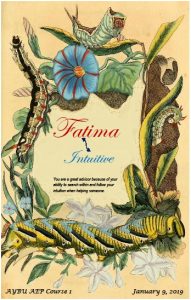
I smiled when I got the card Intuitive because that’s an attribute I have been associated with since my childhood because my instinct would sometimes work to identify people’s nature or state. For example, I once saved a man’s life in a pool when I was eight years old by feeling something was not right and alerting a guard. At the age of 14, I had a gut feeling someone was a thief, so I helped the police to catch her. When it comes to advising, I think my instinct helps me in guiding the conversation so as to identify the advisee’s problem. I also try to use my intuition to find solutions that can appeal to the student’s nature.
Explorer – Metin Esen
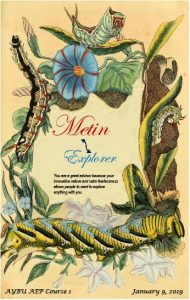
At the end of the course, when I got this small card saying Explorer ornamented with cute caterpillars, I felt really proud and accomplished. To explore is a meaningful word in terms of advising; it has a positive connotation, and evokes motivation, determination, and autonomy. These are the traits of a successful language learner; and I would deem myself an inspiring advisor only if can encourage my students to set sail on waters especially unknown and suspicious to them. In the meantime, I will continue to explore the layers and possibilities of advising to become a better listener and do my best to give the adjectives “innovative” and “fearless” their dues.
Sincerity – Pınar Üstündağ-Algın
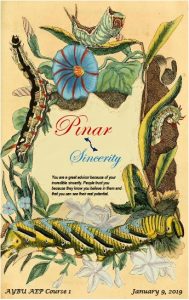
Sincerity is essential to life
It’s nothing but a way of life
Never give up, take over various challenges that come on your path
Come and join to improve with trust
Enjoy a large circle of yourself; your unaffected real personality
Respect all people with full honesty
It’s a state of being genuine in life
Think, support, encourage, and carry connections in life
Yes, it goes a long way on its own but never forget: sincerity is not enough on its own
Observer – Gabor Kotik
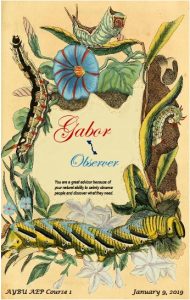
The card I received during my training says that I am an Observer. There is some truth in this: I do think that observing is central to advising. To me, observing is a synonym for caring and paying attention. Advisors are playing with fire: if we get too close, we will burn ourselves. If we stay away, we will not see the light. My goal as an advisor is to get close enough to see the big picture. Also, distant enough not to treat the advisee’s problems as my own. Yes, observing means caring. Choosing the right distance means being professional.
Inquisitive – Aslı Üstün
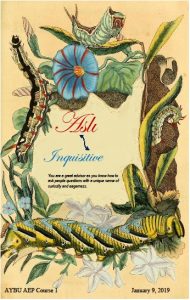
The adjective chosen for me by my trainers was Inquisitive. When I was given the card, I was not sure whether I was inquisitive; however, after a few minutes of contemplation, I could see how well my trainers had analyzed me. I am personally interested in a wide range of topics, and I am eager to learn about details of my interests. I am not satisfied until I investigate a question or a topic for myself. However, I do not directly ask lots of questions, I try to find the answers on my own. I can do a lot of research about anything since I wish to be convinced. When it comes to advising, I hope my inquisitiveness helps the learner to create some questions about his own learning process so that he can evaluate his problem better.
Affectionate- Nurseven Kılıç
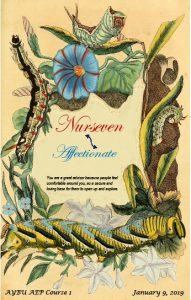
Once I received the card, I felt speechless. In that moment a bunch of emotions was streaming in my body as the word used to describe me was Affectionate, which I associate with the warmth of mothers or motherhood. I truly believe that being affectionate, as a value more than a personality quality, is an integral part of our lives as educators, advisors, counselors, colleagues, friends or whatever roles we have. I believe deep in my heart that in this meaningful and inspiring journey to the self with the help of advising experiences, as learning advisors, we will not only touch the lives of others but also improve personally in significant ways. Needless to say I’m so proud to be a part of this team!
Acknowledgement
This work was supported by the Scientific Research Fund (BAP) at Ankara Yıldırım Beyazıt University, Turkey, as part of Project 3934 in the 2017-2018 academic year.
Notes on the Contributors
Hatice Karaaslan, holding a Ph.D. in Cognitive Science from METU and Learning Advising Certificates from KUIS, works as an EFL instructor and a learning advisor at AYBU-SFL, Turkey. Her interests include corpus linguistics, critical thinking, advising in language learning and blended/flipped learning. hkaraaslan@ybu.edu.tr
Stephanie Lea Howard is an EFL instructor, a learning advisor, an advisor educator and the co-coordinator of the Learning Advisory Program (LAP) at AYBU-SFL, Turkey. She holds a BFA, TEFL 1-2, and Learning Advising Certificates from KUIS. Her interests include mindsets, perfectionism, gamification, advising in language learning, advisor education, peer advisor education, and developing advising tools. steffeee89@gmail.com
Gamze Güven-Yalçın is an EFL instructor, a learning advisor, an advisor educator and the co-coordinator of the Learning Advisory Program (LAP) at AYBU-SFL, Turkey. She holds her bachelor degree in English Language and Literature, a Live Online Trainor Certificate (LANCELOT) and Learning Advising Certificates from KUIS. Her interests include advising in language learning, advisor education, developing advising tools, and gamification in language learning. ggyalcin@ybu.edu.tr
Mümin Şen is an EFL instructor, a learning advisor, and the director of AYBU-SFL, Turkey. He holds an MA degree in Foreign Language Teaching and Learning Advising Certificates from KUIS, and is currently a PhD candidate. His research interests include language learning strategies, self-determination, problem-solving skills, autonomy and IEP. msen@ybu.edu.tr
Müge Akgedik works as an EFL instructor, a learning advisor and the assistant director at AYBU-SFL, Turkey. She holds an MA degree in Social Politics and Learning Advising Certificates from KUIS. She is a DELTA holder and a CELTA tutor. Her interests include learning technologies, professional development, leadership, management and advising in language learning. makgedik@ybu.edu.tr
Ebru Sınar-Okutucu, holding an M.A. in Educational Leadership from Gazi University and Learning Advising Certificates from KUIS, works as an EFL instructor, a learning advisor, and a member of the Professional Development Unit at AYBU-SFL, Turkey. Her interests include teacher education, self- directed PD, educational leadership, advising in language learning, learner autonomy and creativity in language teaching. esokutucu@ybu.edu.tr
Gökçe Arslan is an EFL instructor, a learning advisor, and a member of the Professional Development Unit at AYBU-SFL, Turkey. She holds a BA in English Language Teaching at METU and Learning Advising Certificates from KUIS. Her interests include teacher education, flipped learning, teacher autonomy, and Advising in Language Learning. gokcearsllan@gmail.com
Abdulkadir Güllü, holding an MA in Curriculum and Instruction from Bilkent University and Learning Advising Certificates from KUIS, currently works as an EFL instructor, a learning advisor, and the IT Coordinator at AYBU-SFL, Turkey. His research interests are information technologies for the language classroom, advising in language learning and blended learning approaches. agullu@ybu.edu.tr
Aslıhan Tuğçe Güler, holding an MA in Curriculum & Instruction from İhsan Doğramacı Bilkent University, Turkey and a Learning Advising Course 1 Certificate from KUIS, currently works as an EFL instructor and a learning advisor at AYBU-SFL, Turkey. Her interests include teacher education, motivation in learning and second language acquisiton. tugce.guler@bilkent.edu.tr
Hülya Şen, holding an M.A. in English Language Teaching on language learning strategies from METU, Turkey and Learning Advising Certificates from KUIS, works as an EFL instructor and a learning advisor at METU-SFL. Her interests include language learning strategies, learner autonomy and advising in language learning. husen@metu.edu.tr
Neslihan Atcan-Altan is an EFL instructor, a learning advisor, and the coordinator of the Testing Unit for Departmental Courses at AYBU-SFL, Turkey. She holds an MA in English Literature and Cultural Studies at Cankaya University, Delta Module 2 and Learning Advising Certificates from AYBU-SFL. Her interests include testing, advising in language learning, movies, and literature. nesliatcan@gmail.com
Ayşe Çakır is an EFL instructor and a learning advisor at AYBU-SFL, Turkey. She holds an M.A in Applied Linguistics and TESOL at University of Leicester and Learning Advising Certificates from AYBU-SFL. Her interests are advising in language learning and sociology. aycakir@ybu.edu.tr
Pelin Akıncı-Akkurt is an EFL instructor and a learning advisor at AYBU-SFL, Turkey. She holds an MA in English Language Teaching at Gazi University and Learning Advising Certificates from AYBU-SFL. Her interests include pragmatics, business English and advising in language learning. sevimpelin@yahoo.com
Edin Omerovic is an EFL instructor and a learning advisor at AYBU-SFL, Turkey. He holds a B.A. in English Language and Literature from the University of Zenica and Learning Advising Certificates from AYBU-SFL, and is currently a graduate student of English Language and Literature at the Social Sciences University of Ankara. His interests include English language and literature, and advising in language learning. its.edin@gmail.com
Fatima Rocchi-Whitehead is an EFL instructor and a learning advisor at AYBU-SFL, Turkey. Originally Italian, she holds a BA in English Literature from the University of London, Goldsmiths, an MA in TEFL from the University of Birmingham, the UK, and Learning Advising Certificates from AYBU-SFL. Her interests are learner autonomy, teacher development, praxis curriculum and critical pedagogy. hudhud27@hotmail.com
Metin Esen is an EFL instructor, a learning advisor, and a member of the Professional Development Unit at AYBU-SFL, Turkey. He holds an M.A. in Curriculum and Instruction at Bilkent University and Learning Advising Certificates from AYBU-SFL. His interests are continuous professional development, teacher training, teacher induction and orientation, advising in language learning, and technology in education. metinesen@ybu.edu.tr
Pınar Üstündağ-Algın is an EFL instructor and a learning advisor at AYBU-SFL, Turkey. She currently works on her master’s degree on the specific topic of learner autonomy and holds Learning Advising Certificates from AYBU-SFL. Her academic interests are advising in language learning, learner/ teacher autonomy, psycholinguistics, and children’s literature. pinarustundag81@gmail.com
Gabor Kotik is an EFL instructor, a learning advisor, and a member of the Independent Learning Center team at AYBU-SFL, Turkey. He holds two language-related master’s degrees in Russian and French Studies and Learning Advising Certificates from AYBU-SFL. His interests include developing tools for language learning, and advising in language learning (especially with learners of languages other than English, including Russian and French). kotikga@gmail.com
Aslı Üstün is an EFL instructor and a learning advisor at AYBU-SFL, Turkey. She holds Learning Advising Certificates from AYBU-SFL. Her interests include ESP and learner autonomy. asliustun60@gmail.com
Nurseven Kılıç currently works as an EFL instructor and the coordinator of the blended learning program at AYBU-SFL, Turkey. She is a PhD candidate in the field of Guidance and Psychological Counseling at Eskişehir Osmangazi University. Her interests include self-construals, moral development, narcissism, schema theory, happiness, and blended learning. nkilic@ybu.edu.tr

Hi to all the (many, many) contributors,
There are two powerful main ideas I will take away from reading your piece.
First of all, what a wonderful concept and practice you’re describing. I love the idea of teachers/trainers giving their students/trainees cards at the end of the course, and writing one key word which best represents the student’s/trainee’s “standout” qualities. From your comments, it’s clear that this practice gave rise to a variety of reflective reactions in you – not only immediately gratifying reactions, such as satisfaction at a job well done, or a feeling that you had been “seen” and understood by your mentors, or confidence that you could take forward into your teaching – but also, crucially, surprise, and sometimes a slight uneasiness. I think I was most interested and moved by the places in this article when some of you admitted to being somewhat surprised or bemused by unexpected words which you were given. At such moments, you really had to “dig” a bit for deeper explanations/meanings in these words. Some of you dug really deep and remembered incidents from your childhood which had shaped you and which uncannily corresponded to the word. Others (like Aslıhan with his word “honesty”) chose to face the ambiguity in the word and the possibility that his most standout quality can also be “hard to live with” sometimes. These moments in the text were the most interesting to me because they reminded me that (at least in my experience) it’s these moments of surprise/unease/ambiguity which produce the most hard-won reflections, the ones that have the most power to change one’s path.
I also really admire the overall tone of the article, which is very comforting, positive, and encouraging. If one of your goals is to remind other learning advisors out there (like me) that they are part of a larger community of teachers/advisors, all at different places in their development, but all working hard to make these experiments in autonomy useful, for our students and our world, then, well, I think you achieve that goal with this piece. It has a soft, meditative, poetic rhythm to it – so it’s a nice “pick-me-up” for this quiet Sunday afternoon as I read and comment on it, and hopefully I can remember its calm energy as I dive back into the crazy week ahead.
Since the central inspiration and the driving concept of this piece is language itself – and the power of specific, well-chosen words as prompts for reflection – if I could make a couple of suggestions for making the piece more effective, they would have to do with paying attention to where more precise and more specific word choice could really improve the impact of the piece and make your purpose clearer.
Right now, I don’t think the title and the introduction are as effective as they could be in showing readers what will happen in the rest of the article, and what the piece’s overall tone, method, and purpose will be. The title promises “A closer look at learning advisors’ identity construction process” – that sounds overly technical to me, and doesn’t seem to capture the main idea very well. I feel that the individual entries in the article don’t so much describe a “process” – at least, not in the sense that we are guided through various possible steps of constructing an identity. I think a title that’s a bit more metaphorical might reflect the text better – something like “Seeing and being seen through words – reflections on our learning advisor identities”…?
Conversely, perhaps, in the introduction, I think the wording of some of the ideas should be less metaphorical, and more precise and to the point. When I first read the intro, I really resisted the broad, sweeping language of the first two sentences: “One’s identity formation process as a learning advisor is inevitably determined or molded by her or his personality features that stand out. It is often these prominent characteristics that dominate her or his understanding of and attitude towards the science and practice of language advising although it is very likely that the formal advisor training content often helps surface relatively dormant qualities as well.” I wasn’t sure how to read these claims. If I read it one way, it sounds overly simplistic to say that identity formation is “inevitably determined” by one or two personality features. But then again, I noticed that you hedge a bit on that claim by saying “determined OR molded,” to which I’d say, well, then it’s sort of obviously true that identity is determined or molded by personality. So, I’m not sure whether much of importance is being said here at all. I think you could just jump into the already-interesting specific details of the situation without needing such vague theoretical statements. There are a few other phrases in the intro which confuse me – such as when you say that advisors’ “outstanding qualities…blend smoothly with their identities,” or when you refer to a mystical-sounding “moment of unification” within advisors. In these cases, grounding the metaphors in more exact terminology or examples would help me understand better what you mean.
In the body of the text itself, I really appreciated the moments when your reflections were made concrete with specific real-life examples or anecdotes – for example, when Fatima jumps into the pool at age 8. Unfortunately, these moments are rare, and as I read, I found myself getting a bit disappointed when you only offer typical metaphorical images, such as rollercoaster rides and blue skies, without relating specific examples/anecdotes which would relate those universalized metaphors directly to your actual, day-to-day work as advisors. I think all the entries could be made much more powerful by swapping out some of that received language and replacing it with real details from your life experiences (which from your bios I know are vast and various!)
I’ll also add one very minor, nitpicky detail – but as someone who studied poetry, my conscience wouldn’t rest unless I pointed out, Gökçe, that you slightly misquote Robert Frost 😉 The lines are actually: “Two roads diverged in a wood, and I— / I took the one less traveled by” (I have always read those two “I”s separated by the line break as a wonderful linguistic metaphor for the multiple self, the split identity, as it/they reflect(s) and stumble(s) out loud on its/their complex journey(s) – an appropriate image in the context of your multivocal article.
I just want to conclude my (probably already too long) comments by saying that I’m very happy that I was invited to join this dialogue with you all, and I am really looking forward to seeing how it develops. I have also been working on a group article with six of my language advisor colleagues, so seeing how you all have managed to assemble such an elegant piece with so many more contributors is inspiring!
Best,
Joe
Hi all,
I was recommended to read this blog by a colleague who knows about my reading interests. I am happy that I read both the article and the reply to it, together, because I found the two pieces of writing, the article and the reply, connecting in various ways. I wanted to take this opportunity to offer a short commentary.
I would like to first give a brief introduction to my reading interests so that I could add to the multiple meanings the following lines I am about to write will give rise to. I am interested in reading about language and metaphors, informed by universal approach (Lakoff & Johnson, 1980), cultural linguistics and conceptualizations, theories of (im)politeness, research cultures and post-structuralism. I find both the article and the reply evoking multiple responses in terms of my reading interests.
To start with, I would like to use two quotations from two pieces of readings:
In our rush to a particular kind of application in this ontological turn that may not work—to conventional social science research methodologies—I am reminded of Lacan’s (as cited in Ulmer, 1985) caution ‘first it is necessary to read … avoid understanding too quickly.’ (St. Pierre, 2017, p. 1081)
For anyone beginning to play with what all of this might mean for our interventions in the world, Lacan cautions, “…to read does not obligate one to understand. First it is necessary to read… avoid understanding too quickly” (quoted in Ulmer 1985: 196). (Lather, 1991, p. 9).
In these quotations, Lacan has been referred to.
In St. Pierre’s piece the word “first” does not start with a capital letter and in Lather’s piece it does… But finding and pointing out ‘the correct’ form of the detail is not the point here. The way the word is quoted (first vs. First) creates multiple readings just like the slight (mis)quotation of Robert Frost in Gökçe’s heteroglossic writing piece does. Now I am going back to Lacan’s comment about reading and meaning-making…
Inspired by Lacan’s quote and other scholars (De Landa 2006, Foucault 1966/1970, Deleuze & Guattari, 1980/1987), I would like to suggest that research discourse does not have to follow structures of structuralism. Research does not have to claim that the purpose of language is to mean or communicate, or to enforce or provide order, coherence, certainty or clarity. Deleuze and Guattari (1980/1987) reject the thought that language can be the medium for noise-free communication and dialog. They theorize that language originates from collective assemblages of enunciation (Deleuze, & Guattari, 1987, p.88).
A reading of the article through the lens of this alternative paradigm looking at meaning as assemblages would inevitably bring different responses as reply from the commentators. For me the article reads as an assemblage, with the voices coming through different planes- through metaphors, multimodality (symbols, pictures and colors, etc.) and heteroglossic (Bakhtin, [1934/35]1981) references presented by multiple contributors together with their bios and the play of semiotic occurrences such as broadness, “mystical-sounding” phrases, vagueness, simplicity and the like.
I look forward to reading more of the work and comments presented on this platform. Thank you for sharing your inspiring work and comments.
Best,
Hatice Celebi
References
Bakhtin, M. ([1934/35] 1981). “Discourse in the novel.” M. M. The Dialogic Imagination: Four Essays. Austin: U of Texas P, 259–422
De Landa, M. (2006). A new philosophy of society: Assemblage theory and social complexity. New York, NY: Continuum.
Deleuze, G., & Guattari, F. (1987). A thousand plateaus: Capitalism and schizophrenia. (B. Massumi, Trans.). Minneapolis, MN: University of Minnesota Press. (Original work published 1980)
Foucault, M. (1970). The order of things: An archaeology of the human sciences. (A. M. S. Smith, Trans.) New York, NY : Vintage Books. (Original work published 1966)
Lakoff, G., & M. Johnson. (1980). Metaphors we live by. Chicago: University of Chicago
Press.
Lather, P. (1991). Getting smart: Feminist research and pedagogy within/in the postmodern. Routledge.
St. Pierre, E. A. (2017) Deleuze and Guattari’s language for new empirical inquiry, Educational Philosophy and Theory, 49:11, 1080-1089,
Dear Joe and Hatice,
Thank you for your much appreciated feedback on a very precious Sunday afternoon, Joe, especially right before a hectic week ahead; and hope you have been enjoying the text’s calm energy so far. Likewise, many thanks Hatice for including our piece in your reading list, and spicing up the text as well as the review with your insightful, research-informed commentary.
This idea of giving cards is very much associated with this strategy of advising, intuition, and if we regard the entire training as an extended reflective dialogue, we might say toward the end, as they build enough rapport and trust, the trainers are sort of taking a risk and introducing the cards. That’s why, similar to Joe, I tend to perceive those moments of surprise, unease or ambiguity as well as those of satisfaction or confidence powerful and critical. As such, it would be unfair to keep these beautifully designed cards in some folder and forget about them, rather than sharing them with a much broader learning advisor community.
As to Joe’s suggestions for improvement, the kind of more precise and specific language was aimed to be used in the “Journey to the Advisor Within” text, the introductory paper preceding the two reflective practice papers. This visual message board, or rather an assemblage in Hatice’s terms, was planned entirely as a rather playful piece employing various genres and enjoying a greater level of flexibility and fluidity in a non-hierarchical and proliferating manner, reflecting the features outlined by Hatice in her reference to Lacan (as cited in Ulmer, 1985) delaying gratification and “avoiding understanding too quickly.” Nevertheless, I understand Joe’s concern as a reader longing for “noise-free communication and dialog” (in Hatice’s commentary) to be very clear about what to expect before you proceed much, in the introduction.
Again, in Joe’s review, the need for more real-life experiences, replacing metaphorical images, is emphasized, and I guess this is a cultural aspect in that here we widely use metaphors while expressing our feelings and thoughts, and metaphor use helps people open up and reflect more easily. How would you guys describe your metaphor use as learners or as learning advisors? Do you think there might be a cultural element at play?
The lines from the poem with the line break and two “I”s correspond to multiple, split selves, as it might be the case with the novice advisors who are experiencing some sort of transformation, mostly from their teacher selves, trying hard to supress their old habits of guiding their learners quite directively and let the new ones flourish with more practice in the field. Therefore, we are all at different points on the learning trajectory (not the ‘process,’), and our individual journeys do not follow a predictable pattern.
Many thanks Joe and good luck with your six-author group article; hope to read it soon! And many thanks Hatice for this collective reflection on research discourse as well as on reading and meaning-making!
Best wishes from Turkey,
Hatice-